 |
Nepal Environment |
|
|
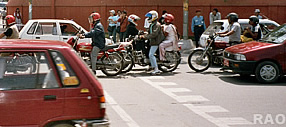 |
| The
Bagmati has become a vaste garbage dump |
 |
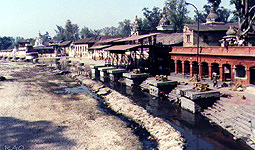 |
|
The
country's most sacred river, the Bagmati, is in danger of being destroyed
by pollution. The river is being used as a depository for sewage and garbage
by the growing population fo the Kathmandu Valley.
Over
the ages Nepalese monarchs have been cremated on its banks. The Bagmati
was once used by thousands of Nepalese for recreational and religious purposes. |
|
Celebrated
in music, poetry and literature it is often referred to as the Ganges of
Nepal. A lot of funeral ceremonies take place in Pashupatinath. Now the
volume of the water had reduced to such extend that the river is no longer
the big river that used to be.
|
Garbage
dump
|
 |
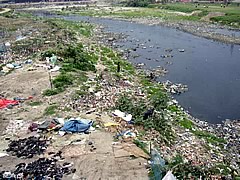 |
|
Garbage dump Most
of the waters are tapped by an increasing number of factories, especially
carpet factories and households. So most of water is tapped before it reaches
the river. household garbage comes from shops and houses and its brought
in plastic bags and thrown here. The Bagmati is a huge rubbish dump effectively,
crawling with flies and rubbish. The water is black. It is almost a dead
river. |
|
|
Battle
to clean up
|
 |
he
scale of problems is recognized by the Nepalese government. The situation
is critical that it will be very difficult for the government or any other
agency to change the situation at Bagmati at once. Nepal is one of the
poorest countries in the world and doesn't have the money to tackle other
key environmental issues such as pollution and deforestation in the Himalayas.
if the Bagmati is to cleaned up, it looks as if most of the money will
have to come from overseas donors.
top
| Pashupatinath
area: More comfortable for tourists |
 |
Pashupatinath
area looks cleaner than it was in the past. It is beggar-free too.
No shops can be seen on the pavements of the roads within the periphery
of Pashupati area. Thanks to the Pashupati Region Development Fund (PRDF),
which has taken initiatives to upgrade the world heritage site.
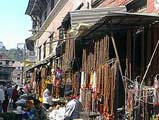 |
| A
shopkeeper, who has been running a cosmetic shop at the Pashupati is happy
to see the holy Pashupati area becomes cleaner. He is still happier to
see his yard beggar-free whom he had to scold time and again as they used
to harass his customers. He also points to the changes inside the temple.
He feels comfortable to enter the temple since he has no longer to hear
the calls of Brahmins nowdays to accept tika from their hands in return
of dakshina, money to Brahamin. |
|
he
PRDF started action against encroachers of the roads within its premies
by deploying a team of ten patrol guards from last May. Under these initiatives,
the PRDF has prohibited all types of businesses on both sides of the roads
within the Pashupati area and even beggars are not allowed to walk begging.
As the street businesses and begging have been strictly checked, the streets
of the area look cleaner now.
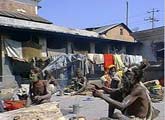 |
| But
the initiative has badly affected the beggars and the Brahmins who are
living in and around the Pashupati temple for their livelihood. The guards
on patrol even say that the number of beggars is also decreasing as they
are finding it hard to maintain their lives by begging in the area.
Now the beggars have been forced to live at Jamkeshori and Taxi Park of
the Pashupati premises. |
|
Other
sufferers of the PRDF are the Brahmins who make their livelihood by offering
tika to the pilgrims to the Pashupati temple.
he
PRDF has also prohibited the Brahmins to sit with a view to offering tika.
They are now forced to leave our profession since we are not allowed to
offer tika in the vicinity of the temple. They do not make even a
rupee some day. Some Brahmins have left the temple as they found their
profession insecure to sustain their live.
November
2001
top
| Information |
 |
 |
|
Nepal |
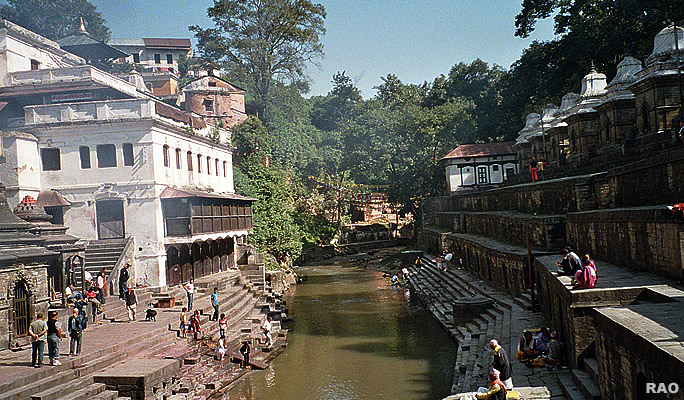
|
|
Pashupatinath
|
|






